The danger is that in times of crisis we look for a savior
“The danger is that in times of crisis we look for a savior”
On Donald Trump, Pope Francis says: “I don’t like to aniticpate events. Let us see what he does, we can’t be prophets of disasters”
Vatican City 22 ENE 2017 - 00:36 CET
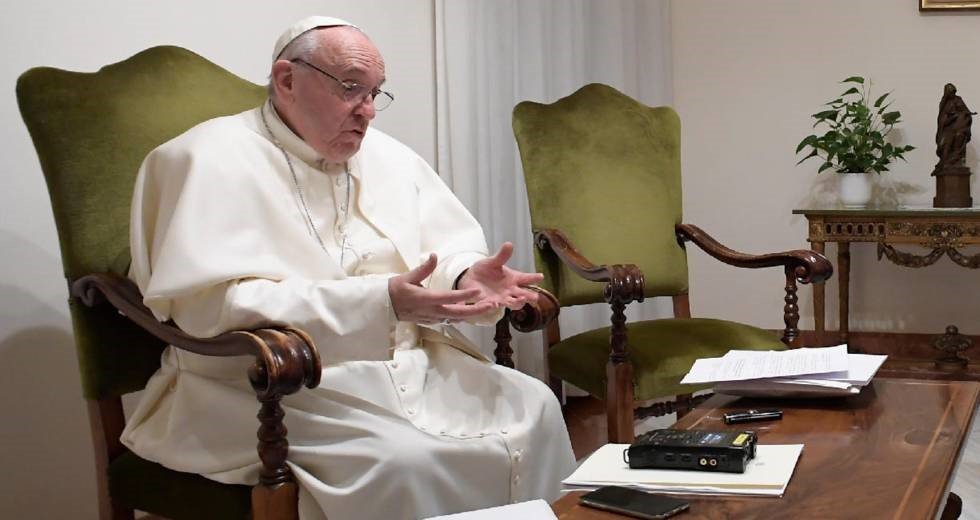 Pope Francis during the interview with EL PAÍS on Friday. L'OSSERVATORE ROMANO
Pope Francis during the interview with EL PAÍS on Friday. L'OSSERVATORE ROMANO
On Friday, just when Donald Trump was being sworn in to office in Washington, Pope Francis was giving a long interview to EL PAÍS at the Vatican, during which he was calling for prudence in the face of the alarm bells that were ringing due to the new US president.
During an hour and 15 minutes, in a simple room in the Casa de Santa Marta, where he lives, Jorge Mario Bergoglio, who was born in Buenos Aires 80 years ago and is on his way to completing his fourth year as Pontiff, explained that “in the Church there are saints and sinners, decent men and corrupt men,” but that what most worries him is “a Church that has been anesthetized by mundanity,” one that is far from the problems of the people.
The hallmark of the Church is its proximity, being close siblings. We all are the Church
Francis showed himself to be up to speed not just with what is happening within the Vatican, but also in the southern border of Spain or in the tough neighborhoods of Rome. He says that he would love to travel to China – “as soon as they invite me” – and that, although he sometimes “slips up,” his only revolution is the Evangelical one.
The drama of the refugee crisis has affected him greatly - “that man cried and cried on my shoulder, with the life-jacket in his hand, because he hadn't managed to rescue a four-year-old girl” – as much as the visits he has made to women who were sold into slavery by prostitution mafias in Italy. He still does not know whether he will die as pope or will opt for the open road of Benedicto XVI. He admits that sometimes he has felt used by his Argentinean countrymen, and he calls on Spaniards to do something that looks easy but is not: “Talk to one another.”
Question. Your Holiness, after nearly four years in the Vatican, what is left of that street priest that came from Buenos Aires to Rome with the return ticket in his pocket?
Answer. He is still a street priest. Because, as soon as I can go out on the streets to greet people at the general audiences, or when I am traveling... my character has not changed. I'm not saying that is deliberate: it has been a natural thing. It is not true that you have to change here. To change is unnatural. To change at 76 is putting on makeup. Perhaps I cannot do everything I want, but my street soul is alive, and you can see it.
Q. In the last days of his papacy, Benedict XVI said about his last years at the head of the Catholic Church: "The waters ran troubled and God seemed asleep". Have you felt that loneliness too? The Church hierarchy was asleep with regard to people's problems, both new and old?
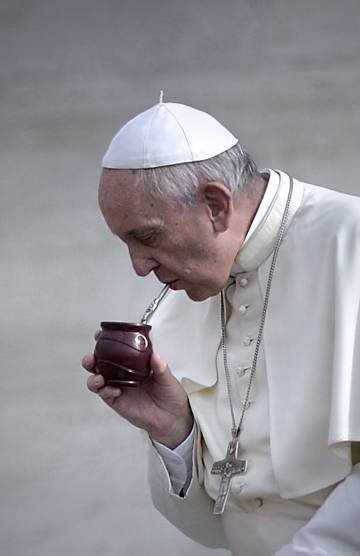 The pope drinks mate during an audience in Rome on August 31, 2016. STEFANO SPAZIANI
The pope drinks mate during an audience in Rome on August 31, 2016. STEFANO SPAZIANI
A. Within the Church hierarchy, or among the Catholic Church's pastoral agents (bishops, priests, nuns, laymen), I am more afraid, rather than of those who are asleep, of those who are anesthetized. Those who are anesthetized by worldly affairs. They sell out to worldliness. That is what worries me. Everything is calm, everything is quiet, when everything goes right. Too much order. When you read the Acts of the Apostles, Saint Paul's epistles, it was a mess, there were troubles, people moved. There was movement and contact with people. An anesthetized person is not in touch with people. He protects himself against reality. He is anesthetized. Nowadays there are so many ways of anesthetizing oneself against the daily life, aren't there? Maybe the most dangerous illness for a pastor is the one produced by anesthetics, which is clericalism. I am here and the people are there. But you are those people's pastor! If you don't take care of those people, if you give up on taking care of those people, you should pack your bags and retire.
Q. Is there a part of the Catholic Church that is anesthetized?
A. It is a risk that we all have. It is a danger, it is seriously tempting. Being anesthetized is easier.
Q. It is a better life, a more comfortable life.
A. That is why, rather than those asleep, there is that anesthetized state that gives the worldly spirit. A spiritual worldly spirit. I am always struck by the fact that Jesus Christ, in his last supper, when he prays to his Father on behalf of his disciples, he does not ask "Look, keep from breaking the fifth commandment, keep them from killing, from breaking the seventh commandment, keep them from stealing". No, he says: "Keep them from the evils of the world, keep them from the world". The worldly spirit anesthetizes. When that happens, the pastor becomes a civil servant. And that is clericalism, which is the worst evil that may afflict today's Church.
Q. The troubles that Benedict XVI faced towards the end of his papacy and that were inside that white box that he gave you in Castel Gandolfo, what are they?
A. A very normal sample of daily life within the Church: saints and sinners, honest people and crooked people. Everything was there! There were people who had been questioned and were clean, workers... Because here, in the Curia, there are true saints. I like to say it. We talk too easily about the level of corruption in the Curia. And there are corrupt people. But there are also many saints. Men that have spent all their life serving people anonymously, behind a desk, or in conversation, or in a study, to get... Herein there are saints and sinners. That day, what most struck me was holy Benedict's memory. He said: "Look, here are the proceedings, in the box". An envelope twice this one. "Here is the sentencing of all the individuals". And here, "So-and-so, that much". He remembered everything! An extraordinary memory. And he retains it.
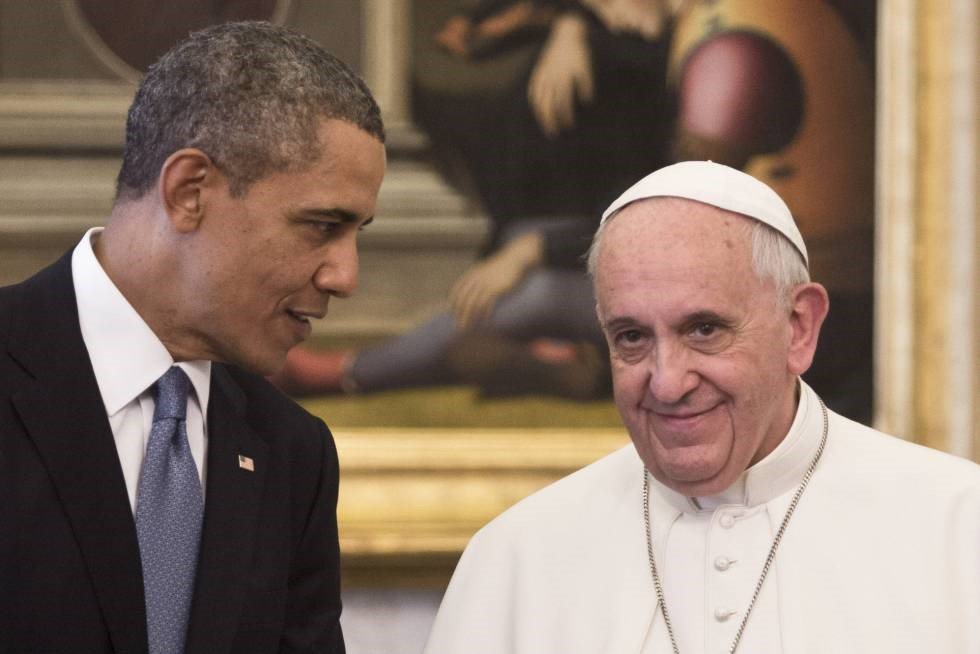 Barack Obama visits Pope Francis in Rome on March 27, 2014. STEFANO DAL POZZOLO/CONTRASTO/VAVATICAN POOL
Barack Obama visits Pope Francis in Rome on March 27, 2014. STEFANO DAL POZZOLO/CONTRASTO/VAVATICAN POOL
Q. Does he feel alright, health-wise?
A. Upwards, he feels fine. His problem are the legs. He needs help to walk. He has an elephant's memory, even in nuances. I may say something and he goes: "No, it wasn't that year, it was that other year".
Q. What are your main concerns with regard to the Church and the world in general?
A. With regard to the Church, I would say that I hope that it never stops being close. Close to the people. Proximity. A Church that is not close is not a Church. It's a good NGO. Or a good and pious organization made up of good people that does good, meets for tea and work in charity... The hallmark of the Church is its proximity, being close siblings. We all are the Church. Therefore, the problem we should avoid is breaking that closeness. Closeness among everyone. Being close is touching, touching Christ in flesh and blood through your neighbor.
Hitler didn't steal the power, his people voted for him, and then he destroyed his people
When Jesus tells us how are we going to be judged, Matthew chapter 25, he always talks about reaching to your neighbor: I was hungry, I was in prison, I was sick... Always being close to the needs of your neighbor. Which is not just charity. It is much more.
Also, in the world, there is war. We have a World War III in little bits. Lately there is talk of a possible nuclear war as if it were a card game: they are playing cards. That is my biggest concern. I am worried about the economic inequalities in the world: the fact that a small group of humans has over 80% of the world's wealth, with all its implications for the liquid economy, which at its center has money as a god, instead of the human being. Hence the throwaway culture.
Q. Your Holiness, about the world's problems that you have just mentioned, Donald Trump has just become the president of the US, and the whole world is tense because of it. What do you think about that?
A. I think that we must wait and see. I don't like to get ahead of myself nor judge people prematurely. We will see how he acts, what he does, and then I will have an opinion. But being afraid or rejoicing beforehand because of something that might happen is, in my view, quite unwise. It would be like prophets predicting calamities or windfalls that will not be either. We will see. We will see what he does and will judge. Always on the specific. Christianity, either is specific or it is not Christianity.
It is interesting that the first heresy in the Church took place just after the death of Jesus Christ. The gnostic heresy, condemned by the apostle John. Which was what I call a spray religiousness, a non-specific religiousness. Yes, me, spirituality, the law... but nothing concrete. No, no way. We need specifics. And from the specific we can draw consequences. We lose sense of the concrete. The other day, a thinker was telling me that this world is so upside down that it needs a fixed point. And those fixed points stem from the concrete. What did you do, what did you decide, how do you move. That is what I prefer to wait and see.
Q. Aren't you worried about the things we have heard up until now?
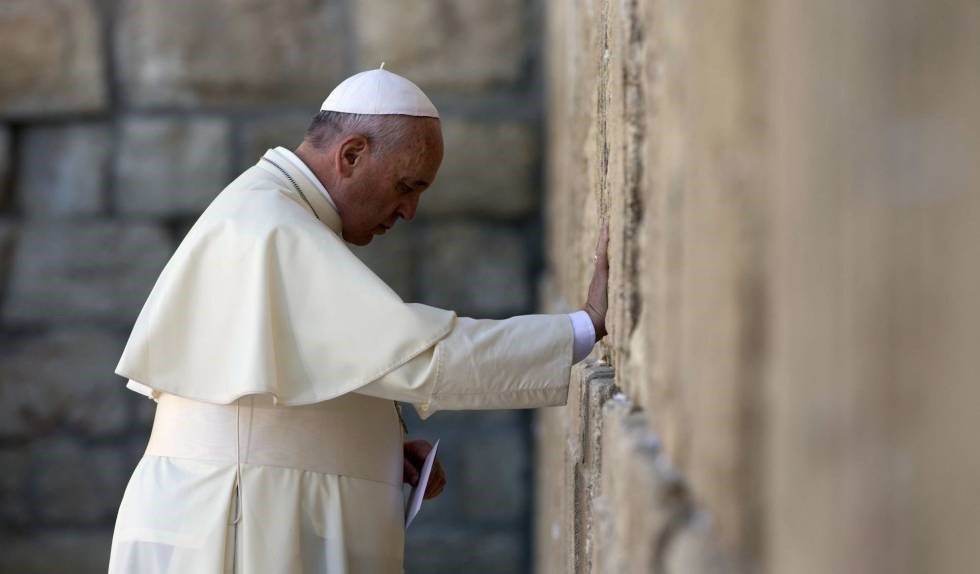 The pope at the Wailing Wall in Jerusalem in May 2014. ANDREW MEDICHINI AFP
The pope at the Wailing Wall in Jerusalem in May 2014. ANDREW MEDICHINI AFP
A. I'm waiting. God waited so long for me, with all my sins...
Q. For the most traditionalist sectors, any change, even if it is only in the language, amounts to treachery. For the other end, nothing is ever enough. You have said that everything was already written in the Gospel's essence. Is it then a revolution of normalcy?
A. I try —I don't know if I succeed— to do what the Gospel says. That is what I try. I am a sinner and not always successful, but that is what I try. The history of the Church has not been driven by theologians, or priests, or nuns, or bishops... Maybe in part, but the true heroes of the Church are the saints. That is, those men and women that devoted their lives to make the Gospel a reality. Those are the ones that have saved us: the saints. We sometimes think that a saint is a nun that looks up to the heaven and rolls her eyes. The saints are the specific examples of the Gospel in daily life! And the theology that you learn from a saint's life is immense. There is no doubt that the theologians and the pastors are necessary. They are part of the Church. But we must come back to that: the Gospel. And who are the best messengers of the Gospel? The saints.
You have used the word "revolution". That is a revolution! I am not a saint. I am not making any revolution. I am just trying to push the Gospel forward. In an imperfect way, because I make my blunders from time to time.
Q. Don't you think that many Catholics may feel something like the syndrome of the prodigal son's sibling, who thinks that you are more focused to those who left than to those who remained and obey the Church's commandments? I remember than in one of your trips, a German journalist asked you why did you never talk about the middle class, those who pay their taxes...
A. There are two questions in there. The syndrome of the eldest child: I know that those who feel comfortable within a Church structure that doesn't ask too much of them or who have attitudes that protect them from too much contact are going to feel uneasy with any change, with any proposal coming from the Gospel. I like to think about the owner of the hotel where the Samaritan took the man beaten and robbed by thieves along the way. The owner knew the story, the Samaritan had told him: a priest had passed by, he looked the time, saw that he was late for temple and left the man abandoned, he didn't want to get blood-stained because that would prevent him from celebrating according to the law. A lawyer passed by, he looked and said: "I better not get involved, it will make me late, tomorrow in court I will testify and... No, it's better not to get involved". As if he had been born in Buenos Aires, he turned around, with that city's slogan: "Better not get involved". And then came this one that was not Jewish, he was a pagan, he was a sinner, he was deemed the scum, and he was moved and he helped him get up. The owner's astonishment was tremendous, because it was unusual.
The novelty of the Gospel however astonishes because it is essentially scandalous. Saint Paul tells us about the scandal of the cross, the scandal of the Son of God become man. A good scandal, because Jesus condemns the outrage against children too. But the evangelical essence is scandalous by those days criteria. By any worldly criteria, it is an outrageous essence. So the eldest child syndrome is the syndrome of anyone who is too settled within the Church, the one who has everything clear, knows what must be done and doesn't want anyone to listen to strange sermons. That is the explanation for our martyrs: they gave their lives for preaching something that was upsetting.
My concern is that women give us their thinking, because the Church is female, is Jesus Christ's wife, and that is the theological foundation of women
That is your first question. As for the second one: I didn't want to answer the German journalist right there, but I told him: I am going to think about it, you may be somewhat right... I am always talking about the middle class, even without mentioning it. I use a term coined by the French novelist Malègue, who talks about "the middle class of sanctity". I am always talking about parents, grandparents, nurses, the people who live to serve others, who raise their kids, who work... Those people are tremendously saint! And they are also the ones who carry the Church onward: the ones that earn their living with dignity, that raise their children, that bury their dead, that care for their elders, instead of putting them into an old people's home, that is our saintly middle class.
From an economic point of view, today, the middle class tends to vanish more and more, and there is the risk that we take shelter in our ideological caverns. But this "middle class of sanctity": the father, the mother, who celebrate their family, with their sins and their virtues, the grandfather, the grandmother. The family. At the center. That is "the middle class of sanctity". That was a great insight on the part of Malègue, who writes a sentence that is really impressing. In one of his novels, Augustine, an atheist asks him: "But you believe that Jesus Christ is God?" He is presenting the problem: Do you think that the Nazarene is God? "For me, it is not a problem", is the protagonist's answer, "the problem would have been if God didn't become Christ". That is "the middle class of sanctity".
Q. Your Holiness, you have mentioned the ideological caverns. What do you mean by that? What are your concerns in this regard?
A. It is not a concern. I am stating the facts. One is always more at ease in the ideological system that he has built, because it is abstract.
Q. Has it been exacerbated in recent years?
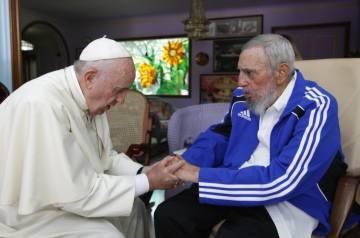 The pope with Fidel Castro during a visit to Havana in September 2015. ALEX CASTRO AP
The pope with Fidel Castro during a visit to Havana in September 2015. ALEX CASTRO AP
A. It has always existed. I would not say it has been exacerbated, because there has also been much disappointment. I think there was more in the period before World War II. I think. I haven't given it much thought. I am putting things together... In the restaurant of life you always get many ideological dishes. Always. You may always take refuge in that. They are shelters that prevent you from connecting with reality.
Q. Holy Father, these years, during your trips, I have seen you get emotional and move many who listened to you... For instance, I remember three very special occasions: in Lampedusa, when you asked whether we had cried with the women who lose their children to the sea; in Sardinia, when you spoke about unemployment and the victims of the global financial system; in the Philippines, with the tragedy of the exploited children. My questions: What can the Church do about it, what is being done, and what are governments doing?
A. The symbol I proposed for the new Migrations office —in the new structure, I took directly over the department of Migrations and Refugees, with two secretaries— is an orange life jacket, such as the ones we know. During a general audience, there was a group of people working to rescue refugees in the Mediterranean. I was passing through, greeting people, and a man had that thing in his hand and started to cry, on my shoulder, and he went on and on: "I couldn't, I didn't get to her, I couldn't". And when he calmed a little he told me: "She wasn't over four years old, the kid. And she went down. I am giving this to you". This a symbol of the tragedy that we are living. Yes.
Q. Are the governments raising to the occasion?
A. Every one does what they can or what they want. It is a very hard judgment. Undoubtedly, the fact that the Mediterranean has become such a graveyard is food for thought.
Q. I would like to know if you feel that your message, your approach to the margins, to those who suffer and are lost, is welcome, is accompanied by a machine perhaps used to a very different pace. Do you feel that you and the Church go at a different pace? Do you feel protected?
A. I think that, fortunately, the responses are generally good. Very good. When I asked the parishes and the schools in Rome to take in immigrants, many said that it had been a failure. It is not true! It was not a failure at all! A high percentage of Rome's parishes, when they didn't have a big house or they had a very little one, they had their parishioners rent an apartment for an immigrant family. In convent schools, whenever there was room, they welcomed an immigrant family... The answer is that we have done more than you know, we haven't advertised it. The Vatican has two parishes and each parish has an immigrant family. An apartment at the Vatican for one family, another for the other one. The response has been constant. Not a 100%. I don't know the proportion. I think maybe 50%.
Then there is the problem of integration. Each immigrant constitutes a very serious problem. They are fleeing their country, because of hunger or because of the war. And the solution must be there. They are exploited. Take Africa: Africa is the symbol of exploitation. Even when giving their independence, in some countries, they are independent and the owners of their land on the surface, but not underground. So they are always used and abused...
The reception policy has several phases. There is an emergency reception: you have to welcome them, because otherwise they drown. Italy and Greece have led by example. Even now, Italy, with all the problems caused by the earthquake and all that, still cares for them. They welcome them. They get to Italy because it is the nearest shore, of course. I think they also get to Spain through Ceuta. But rather than staying in Spain, most of them tend to go north, in search of better opportunities.
Q. But in Spain there is a fence in Ceuta and Melilla, they cannot go through.
A. Yes, I know. And they want to go north. So the problem is: welcome them, yes, for a couple of months, give them accommodations. But the integration process must start at some point. Receive and integrate. The model for all the world is Sweden. Sweden has nine million people. Of those, 890,000 are "new Swedes", children of immigrants or immigrants with Swedish citizenship. The Foreign minister —I think it was her, the one who came to send me off— is a young woman, the daughter of a Swedish mother and a father from Gabon. Immigrants. Integrated. The problem is integration. On the other hand, when there is not integration, they get "ghettoized", and I am not blaming anyone, but it is a fact that there are ghettos. It may be that they didn't realize at that time. But the young guys who committed the atrocity in Zaventem [airport] were Belgian, they were born in Belgium. However, they lived in an immigrant neighborhood, a closed neighborhood. So the second phase is the key: integration. So much so that, what is the big problem for Sweden now? It isn't that they don't want any more immigrants to come, no! They can't get enough of the integration programs! They wonder what else can they do to get more people to come" It is astonishing. It is an example for the whole world. And it is nothing new. I said it right from the start, after Lampedusa... I knew of Sweden because of all the Argentinians, Uruguayans, Chileans that went there in the era of the military dictatorships and were welcomed there, I have friends who took refuge there and live there. You get to Sweden and they give you a healthcare program, and documents, and a residence permit... And then you have a home, and the following week you have a school to learn the language, and a little bit of work, and you are on your way.
In that respect, Sant'Egidio, in Italy, is another model. The people who came with me on the plane from Lesbos, and nine others who came afterwards. The Vatican is in charge of 22, and we are taking care of them, and they are slowly becoming independent. The second day, the kids were going to school. The second day! And the parents are getting gradually settled, in an apartment, with a bit of work here, a bit of work there... Instructors to teach them the language... Sant'Egidio has that same attitude. So, the problem is: urgent rescue, of course, for everyone. Second: receive, welcome as best as possible. Afterwards, integrate.
Q. Your Holiness, half a century has passed since almost everything happened. The Second Vatican Council, Paul VI's trip to the Holy Land and his embrace with Patriarch Athenagoras. Some people say that in order to know you one must know Paul VI. He was to a point the unappreciated Pope. Do you feel also that way, an uncomfortable Pope?
A. No, no. I think that I should be more unrecognized because of my sins. Paul VI was the unappreciated martyr. (...) Evangelii gadium, which frames the pastoral principles that I want for the Church, is an update of Paul VI's Evangelii Nuntiandi. He is a man who was ahead of history. And he suffered a lot. He was a martyr. There were many things that he wasn't able to do, he was a realistic person and he knew that he wasn't able and he suffered for it, but he offered his suffering. He did what he could. And the best thing that he did was planting the seeds. The seeds of things that history collected afterwards. Evangeli Gadium is a mix of Evangeli Nuntiandi and the Aparecida document. Things that developed from the bottom. Evangeli Nuntiandi is the best pastoral paper after the Council, and it still is current. I don't feel unrecognized. I feel accompanied by all kinds of people, young people, old people... There are some who don't agree, of course, and they have the right, because, if I felt bad because someone disagrees with me, I would have the germ of a dictator in me. They have the right to disagree. They have the right to think that the path is dangerous, that the outcome may be bad, they have the right. But provided they talk, that they don't hide behind others. Nobody has the right to do that. Hiding behind others is inhumane, it is a crime. Everyone has the right to debate, and I wish we all would debate more, because it creates a smoother connection between us. Debating unites us. A debate in good faith, not with slander nor things like that.
Q. You don't feel uncomfortable even with power?
A. But I don't have the power. The power is something shared. The power exists when we make decisions that have been meditated, talked about, prayed, prayer helps me very much, it is a great support for me. I don't feel uncomfortable with power. I feel uneasy with certain protocols, but that is because I come from the streets.
Q. You haven't watched TV for 25 years now, and I hear that you never were very fond of journalists, But you have reinvented the whole communication system of the Vatican, you have made it professional and have made it into a dicastery. Are media that important for the Pope? Is there a threat against the freedom of the press? Can social media be detrimental for the freedom of the individual?
A. I don't watch television. I simply felt that God was asking that of me, July 16, 1990, I made that promise, and I don't miss it. I only went to the television center that was next to the archbishopric to watch a couple of films that I was interested in, that I thought appropriate for my message. I used to love the movies, I had studied a lot about cinema, most of all the Italian cinema of the postwar period, Italian realism, and the Polish director Wajda, and Kurosawa, and several French directors. But not watching TV didn't prevent me from communicating. Not watching TV was a personal decision, nothing more. Communication comes from God. God communicates. God has communicated with us throughout history. God doesn't exist isolated. God communicates, and has spoken, and has accompanied us, and has challenged us, and has made us change course, and he is still with us. You cannot understand Catholic theology without God's communication. God is not static up there, watching how people have fun or ruin themselves. God gets involved, through the word and through his flesh. And that is my starting point. I feel a little afraid when mass media don't express themselves with an ethos of their own. For instance, there are ways of communicating that, instead of helping, weaken unity. A simple case. A family that is having dinner without conversation, because they are watching TV or the kids are with their phones, texting people that are somewhere else. When communication loses the flesh, the human element, and becomes liquid, is dangerous. It is very important for families to communicate, for people to communicate, and also in the other way. Virtual communication is very rich, but there is a risk if it is lacking human, normal, touching communication. The concrete element of communication is what will make the virtual element take the right course. As we see, the specific is non-negotiable, in everything. We are no angels, we are concrete individuals. Communication is key and must go forward. There are risks, as in everything. We must make adjustments. But communication comes from God. There are deficiencies. I have spoken about the sins of communication in a lecture I gave in ADEPA, in Buenos Aires, the association that bring together Argentinian publishers. The chairmen invited me to a dinner in which I gave this lecture. I signaled the sins of communication and said: don't commit them, because you have a great treasure in your hands. Today, communicating is divine, it always was, because God communicates, and is human, because God communicated in a Human way. So, for functional purposes, there is a dicastery, to channel all this. But it is a functional thing. It isn't because communicating is important today. Communication is essential to the human being, because it is essential to God.


 Votes : 0
Votes : 0









